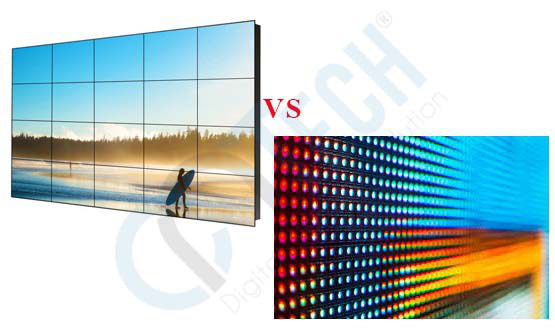What is the difference between LED and IPS screens?
Screen technology is developing like a hurricane. Types of screens are increasingly popular, diverse and modern. However, these technologies vary from resolution, panel technology to backlight technology using projection. To help you better understand, CNTECH will compare the difference between LED and IPS screens.
I. What is an IPS display?
An IPS (In-Panel) display is a type of panel technology for LCD or liquid crystal displays.
High-quality images and detailed graphics are the strong points of IPS technology.
II. What is LED display?
LED or Light Emting Diode is a backlight technology (display technology) that uses LEDs to illuminate each pixel.
What makes LED technologies ideal for displays is that they offer brighter screens with less power consumption and a wider range of sizes.
There are many types of LED modules today including P1, P2, P3, ... to be suitable when organizing indoor and outdoor events, conferences, weddings, advertising content projection, ...

III. Compare IPS and LED screens
1. Technology
-
IPS displays are panel technology.
-
LED display is Display Diode technology or backlight technology.
Although they are fundamentally different in technology, they can be compatible to work together.
2. Energy Consumption
-
IPS monitors provide a specific quality picture, which means they need more power to keep up with everything that happens on the screen.
-
LED screens may display brighter screens, but they actually consume less power than IPS screens. This is what makes LED displays the LCD backlights that are slowly gaining popularity these days.
3. Response Time (Refresh Rate)
One notable drawback of IPS screens is their longer response times (about 10ms).
So is 10ms really that noticeable?
Fast-paced games like Battlefield, PlayerUnknown(PUBG), Battleground, Fortnite, Overwatch and other FPS games in general will show a noticeable difference. This is because IPS displays must process images properly before returning them to the display.
LED screens do not suffer from these problems. In fact, you can find LED screens with refresh rates as high as 144Hz!
You might find 144Hz IPS monitors today, but you'll still see a difference in output. Not to mention the really big difference in price.
4. Display
No matter what angle you're viewing it from, an IPS display allows you to view the screen from wide angles (178° to be exact) without seeing color shifts. This means you can look at the screen anywhere and not worry about color changes.
LED screens may not have the advantage of wide viewing angles but in terms of display brightness. The LED screen is brighter at all angles.



